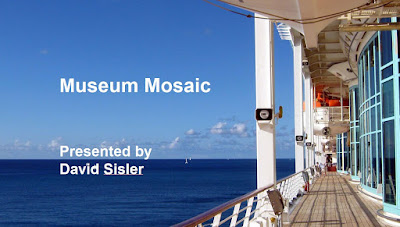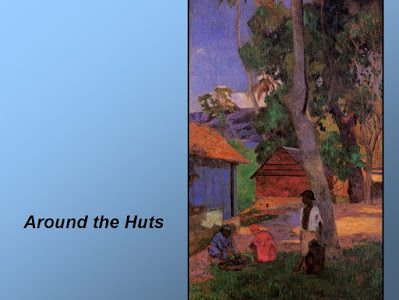May 1, 2021
Martinique: In Gauguin’s Footsteps
In studying the life of Paul Gauguin, Martinique does not take as large a place as does Tahiti, but Gauguin scholars suggest that Martinique was perhaps the most influential of all his experiences.
Gauguin arrived on Martinique in mid-June 1887. According to what authority you are reading, he completed either ten, or twelve or twenty canvasses during his stay.
During his stay in Martinique, Gauguin wrote to his wife three times. Gauguin was delighted with the “Negro hut” he had acquired and was totally captivated by the life of the “Negroes and Negresses. . . milling around all day singing their Creole songs and their perpetual chatter.”
The site of Gauguin’s hut is, today, occupied by the small The Paul Gauguin Memorial Art Center, Le Carbet, Martinique.
The museum has five rooms: the first dedicated to his life; the second on the volcano Mt. Pelee – the 1909 eruption of Mt. Pelee destroyed St. Pierre in three minutes, killing all but one of the town’s 30,000 inhabitants, the sole survivor being a prisoner in the town dungeon; a third dedicated to his work in Martinique, a fourth to his work in Tahiti; and a fifth showing Martinique costumes and artefacts.
The two rooms with reproductions of his work in Martinique and Tahiti are the most popular because most visitors have been seen them before. They are in private collections and seldom reproduced.
The romantic hut he lived in leaked during torrential rain storms and, when the sun blazed down, the island steamed and the humidity rose. In spite of illness and privation – he contracted dysentery and marsh fever – the charm of Martinique, and particularly of its inhabitants, seized Gauguin and their influence gave birth to much of his most admired work, including some of the later masterpieces of Tahiti.
I made this video as a recap for the talk. Enjoy this look back at “Museum Mosaic.” Due to copyright claim, this video cannot be viewed in Iran, Cuba, North Korea, Syria, but I don’t think QB is read in Iran, Cuba, North Korea, Syria. Oh well.
👉 While surfing the ‘Net a day or two ago, I found a list of restaurants that offer discounts to senior citizens. There was no date on the list, so some offers may have expired, but it’s worth checking out. Click on this link for the list.
👉 The Index for the Quarantine Blog, complete through April, is now online.
👉 A Different Address
Attorney Brian DeLaurentis bought an expensive house in Connecticut. The main reason for selecting the neighborhood where he plunked down half a million dollars was the Greenwich zip code. When he found out he was not in the prestige mailing address, he continued to list Greenwich as the city, but put the correct zip, for Cos Cob, a small enclave of the prestigious town. When the Post Office refused to deliver, DeLaurentis sued, and won the right to get his mislabeled mail.
In addition to the snob appeal, money ranks high on the list of reasons for coveting such addresses. In some swanky neighborhoods, property sells for 70 percent more than it does fifteen minutes down the road.
Zip code envy is nothing new, nor is it limited to swank Connecticut addresses. Chevy Chase, Beverly Hills, Palm Springs – you don’t even need to name the states – are all coveted cities in which to promote the lifestyle of the rich and would-be famous.
Some people who want a Beverly Hills address, for instance, will pay $1,000 a year to a private service which has an authentic Beverly Hills street number. Then the word “suite” or “apartment” is added to the address thus giving the impression of a legitimate business or residence. A government postal box rents for $50 a year, but there is no way to disguise the truth. It just would not fit one’s projection of a snooty ambience for one to admit to living in a post office box.
Fifth Avenue is one of the most desirable addresses in New York City. The developers of one building, located between Fifth and Madison Avenue, obtained permission from the city to list their address as the more prestigious 1049 Fifth Avenue, instead of the original, lowly 2 East 86th Street.
A perfectly legal, but at the same time deceptive practice, is to attach the name of a chic address to a business or development which is, in fact, many miles from the actual neighborhood. For instance, the elite borough of Princeton, N.J., thrives on its Ivy League name which leads to “Princeton” shopping centers, car dealerships and residential developments in towns far removed, like Trenton and New Brunswick.
“It’s very misleading,” complains Mark Freda, president of the Princeton Borough Council. “When people go out to buy a home in Princeton, if they aren’t paying attention they may discover they’ve purchased in a different town altogether.”
Case in point is a developer who has built two housing developments, Princeton Crossing and Princeton Ridings, neither of which have a Princeton address. A company spokesman defended the practice by stating, “A builder will use whatever asset he has.”
Communities sometimes change their names to feed off the reputation of a ritzier neighbor. And it is a gimmick which can really pay off. A few years ago, a middle-class town called East Detroit formally changed its name to East Pointe, to play off its proximity to Michigan’s swank Grosse Pointes, home to some of the area’s great automotive families. Property values shot up.
Grosse Pointe Farms broker and appraiser Forman Johnston says, “I don’t think values would have gone up nearly as much if they hadn’t changed their name.”
Al Becker bought a home in Fairfax Station, VA. He was horrified when he found out he would not have a coveted “Fairfax” address, but his mail would be sent to Lorton, a name synonymous with a maximum security prison and a noxious landfill. Property values are significantly lower in Lorton, even though it is basically only the other side of the street.
“Social factors do affect value,” says appraiser Charles A. Moore, who notes that modest homes in a celebrity-rich areas are often worth more than grander manses in Brand X Beltway suburbs. “Everyone wants to live near a celebrity.”
Not everyone deems a prestige address as the ultimate key to success.
Paul was a man who seemed never to have more than a tent which he built with his own hands, or a place he rented while under house address, but he bragged about another address, “a building of God, a house not made with hands, eternal in the heavens.”
Abraham left the most prestigious address of his day, Ur of the Chaldees, and without benefit of a real estate agent, “looked for a city which has foundations, whose builder and maker is God.”
People continue to look for a zip code better than 90210. Heaven is that place, and a place has been paid for and prepared for by Jesus of Nazareth, God’s Son. Vacancies are available.
-30-






No comments:
Post a Comment